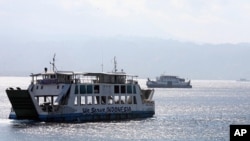Indonesia's scenic island Bali will be the setting for the East Asia summit in November, of which President Obama is expected to attend. The country’s premier tourist destination is seeking to capitalize on business tourism after a difficult decade marked by two terrorist attacks and the SARS and bird flu epidemics.
Flora
In Kendran village, in the center of Bali, everything is green. Delicate rice sprouts peek from terraced fields. Dense thickets of banana trees encroach the side of a road. Shaded gardens decorate the entrance of temples and houses. But despite its lush appearance, water in the village is in short supply.
Made Ruta, one of Kendran’s rice farmers, explains that the public water distribution company PDAM owns two of the three water sources located on the village’s land. He says the local government demanded it prioritize the nearby tourist town of Ubud for water distribution. Thus, he says, for the past five years there has not been enough water during the dry season to properly irrigate all rice fields.
Water crisis
Environmentalist Wayan Gendo Suarna, who chairs the Bali chapter of the Indonesian NGO Walhi, warns that a water crisis looms.
Wayan says that although consumption is highest in the South of the island, where the tourist facilities are located, there are no water resources there. Shortages now exist in the rural and mountainous North, closer to the water sources. He says local policies dictate that the tourism industry, which contributes most to the island’s economy, should come before the needs of rice farmers.
Made Ruta, the Kendran farmer, says the situation is unfortunate.
Nowadays, he says, there’s not much harmony left in the village. In the peak of the dry season farmers may creep at night into their neighbor’s fields to steal water. Because of this problem and the lure of better jobs in the tourist industry, many farmers are tempted to sell their land.
Bali Fokus
Bayu Susila, head of the environment NGO Bali Fokus, says that this is felt throughout Bali.
“In my village, all young people now are working in the cities," said Bayu. "So only the old people, the old generation lives in the village. So when there is a ceremony they come back to the village for one, two or three days and then go back to the city where they can find a better life. So it’s affecting our way of life.”
Bali’s Hindu culture and unique agrarian lifestyle is the island’s main tourist attraction. So Bayu warns that the erosion of the traditional way of life could have dire consequences.
“As a Balinese, I don’t want new investors coming to Bali," said Bayu. "I suggest: please bring your capital elsewhere, to the other provinces, please develop there.The more capital you bring to Bali, the more people will come to Bali, and we’ll be buried there. Because once there is no local traditions, who will care?”
Busy Bali
Bali is a small island, about the size of the tiny U.S. state of Rhode Island. With more than three-and-a-half million residents and about two million tourists a year, officials say Bali is severely overcrowded.
In southern Bali's busy streets, traffic jams choke the towns. Waste is so poorly managed that during the rainy season, when rivers swell, garbage dumped throughout the island end up layering the long, white sand beaches.
Ngurah Wijaya, chairman of the Bali Tourism Board says there is not enough electricity, water and roads to accommodate the island’s successful industry.
“Bali has nothing. The only work we can do here is tourism, so it has to continue," said Wijaya. "We’ve proposed to the government, and the government agreed, to have a moratorium on building new accommodation in Bali. The government should build again the infrastructure in Bali such as electricity, water, accessibility and garbage.
Development
But there is no indication the government will impose a moratorium any time soon. A huge conference center is scheduled to be built soon to accommodate a 2013 APEC summit. Several other big projects are scattered throughout the south of the island. A large Indonesian chain is building another resort on the luxurious compound of Nusa Dua on Geger Beach.
At the base of a high pile of rubble that creeps onto the beach, an extended Balinese family is attending a ceremony. They all gather once every six months to worship the spirits of their ancestors, who they believe are represented by a holy rock that barely peeks from the high tide. Soon, access to this beach will be restricted to the hotel’s clients. But family members say they do not mind.
They say that they are happy there is yet another resort to be built here. The more tourists the better, they say, as they bring cash and good jobs along with them. So, as long as the hotel management lets them hold their colorful ceremony every six months, as has already been agreed, they welcome the new resort with open arms.
The successful tourism industry has made Bali one the richest provinces in Indonesia. Although few Balinese are willing to slow down the pace of development, there are some who worry that the growth may eventually overwhelm the natural beauty that drew people here in the first place.














